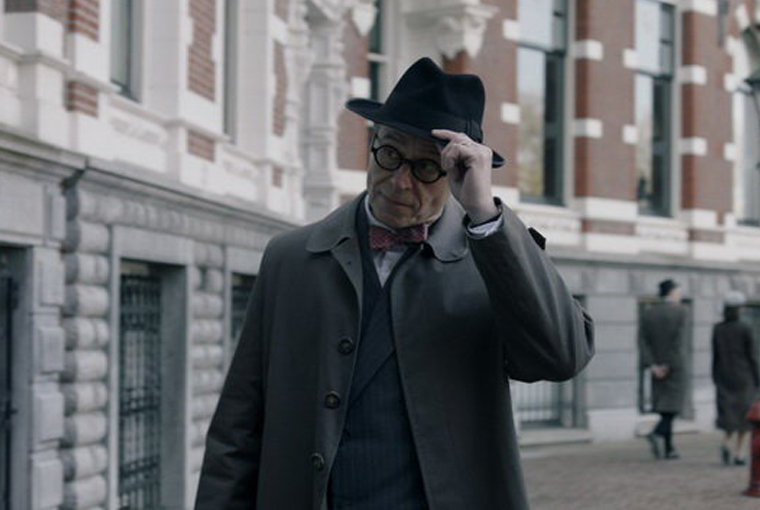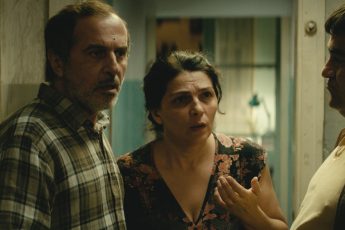In the Name of the Father
Július Ševčík’s A Prominent Patient (Masaryk, 2017)
Vol. 72 (February 2017) by Zoe Aiano
Here we are again, back in 1938 Czechoslovakia. This time the pretext for picking at the never-healing scab of the Munich Agreement is a biopic of Jan Masaryk, then Ambassador to the United Kingdom. The reference to the historical name of Masaryk in the Czech title may trick viewers into anticipating a film about his infinitely more famous father, the first president of the Czechoslovak Republic and origin of a thousand unpronounceable street names throughout the globe, but no. Instead we are presented with the political developments leading up to the Nazi annexation of Czechoslovakia from the perspective of Masaryk Jr. (Karel Roden). Apparently his affinity with his homeland is so profound and indeed physiological that he suffers a nervous breakdown at the loss of the Sudetenland. Checking himself into a clinic in New Jersey, he finds himself recounting the events leading up to the contemporaneous downfall in his nation and his mental health to a gay German psychiatrist (Hanns Zischler), providing a completely implausible and horribly clichéd frame story. Tellingly, a card at the beginning of the film proclaims that A Prominent Patient is based on a true story. What it fails to stipulate is that the whole part about going to America and committing himself is based on a very contemporary style of interpretive truth that is not actually based in any evidence whatsoever.
The first problem with choosing to embody a complex and emotional moment in history through one character is that, in this instance, the character in question is fairly unlikable. Presumably as an attempt at psychological depth or historical accuracy, the horn-rimmed hero is depicted as a work-hard play-hard debauchee. While Masaryk did have a reputation as a lothario, the extent to which women throw themselves at him is improbable at best.
In addition to being quite nauseating and trite in itself, this also provides the justification for a series of off-putting scenes of hedonism with unappealing camera movements, completely inappropriate slow motion and faintly disgusting sex scenes. Masaryk is clearly intended as a lovable rogue who only has his country at heart deep down, but instead he comes off as privileged and self-indulgent, undermining the sympathy the audience is presumably supposed to be experiencing for him and the Czechoslovak nation by extension.
As the film progresses, Masaryk is increasingly established as a counter-figure to Edvard Beneš (Oldřich Kaiser), the pre-war president who is often labelled as a traitor for not putting up any armed resistance to Hitler’s forces, and less frequently vindicated as a far-sighted tactician. In this version of events, Beneš is shown recklessly playing mind games that ultimately fail, deaf to Masaryk’s impassioned pleas to take action. Indeed, all the attempts to build suspense and drama through the political intrigues inevitably fail, first on the ground that they aren’t very well scripted and are historically inaccurate, and secondly on the basis that the ultimate outcome is already known. It may be that the film is intended primarily for a non-Czech audience, perhaps with a view to enlightening British and French viewers about their largely unknown selling-out of Czechoslovakia. Even if that were the case, the diplomatic counter-plotting is so clumsily handled it is hard to imagine anyone learning anything coherent from it.
The film suffers from sloppy heavy-handedness in almost every respect. Much of its imagery is cringe-worthily overused, from the insistence on chess as an obvious reference to diplomatic mind games to the totally unnecessary bare-knuckle fighting as a stand-in for masculine struggles for dominance. Perhaps the worst scene in this regard takes place in a horse stable, which is not only tenuous in itself but also features the highly questionable line “Arabs are good for nothing, but they’re beautiful and a pleasure to ride.” The characters are extreme caricatures lacking any nuance, which in turn is made even more evident by the fact that many of the actors speak with completely inappropriate accents. The whole effect is topped off by intolerably overdramatic music, with a deluge of violins washing over the cinematography composed of completely arbitrary camera angles.
This obsession with reliving 1938 through film makes complete sense given its monumental importance for the Czechs and Slovaks historically. Likewise, the tumultuous dealings that took place make perfect sense as the basis of a drama, just as Jan Masaryk was important and interesting enough to merit a biopic. What is mystifying is why these retellings appear to be getting increasingly banal and superficial, especially as they take on increasing poignancy and relevance within today’s developing international climate.




Leave a Comment